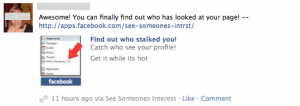Who’s looking at you?
One of the most potent aspects of Facebook, and to a lesser extent Flickr, Twitter and alike, is the opportunity it gives us to pry. Like looking into curtainless windows after dark, we get a unique insight into the lives of other people. We know they’re not faking their profiles – there are too many witnesses for them to misrepresent themselves. And yet they have no idea we’ve been looking. It’s a seductive inequality. But doesn’t it also intrigue us about who has been looking in on our lives.
Despite an abundance of stats, it is notoriously difficult to determine who exactly has visited. Even in closed spaces like Facebook, you cannot find out which of your friends popped by unless they leave a comment or a ‘Like’. Although currently there’s a rash of scams promising to divulge this information, it is impossible to learn who’s simply had a nose around. In fact, Facebook provides less visitor information than just about any other social site despite tracking exactly what each of us is doing and supposedly being a community of ‘friends.’ Flickr and LinkedIn both provide quantitative stats describing views but nothing about who.
However, it is precisely this sort of information that makes these sites so commercially valuable. Google, Amazon, even Facebook, make significant amounts of money from tracking our every move and translating it into personalised advertising. Every click, search or view on their sites helps them to refine their marketting algorithms, honing their understanding of our behaviour in an attempt to distill our essence into something useful.
Wouldn’t it be fascinating to know who has been interested in us? It’s clearly of commercial value, don’t you think there could be social capital there too? Would it help build relationships by exposing the degree of attention we give to each other: highlighting particular areas of common ground but without the need to actually contribute anything tangible? Would help reduce anti-social online behaviour? Back in 1973, the psychologist, R J Watson, identified the negative social effect of anonymity and the associated lack of accountability. Maybe, open transactions might make the web a safer place?
Big Business already has this information about us but looks at it from a purely commercial perspective. What could we do with it?



Trackbacks/Pingbacks
[…] though it might be desirable, no-one can see who’s been looking at your Facebook content. Facebook itself outlines its […]